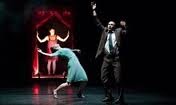 Later I watched Crossing the Line, a 2006 documentary about James (Joe) Dresnok, a US soldier who defected to North Korea in 1962. Amazing story. He was young, from a broken home, disfunctional, didn't get on with his superiors, and one day just walked across the DMZ and into another world. Actually, there were half a dozen defectors over the years, and three others - Larry Abshier, Jerry Parrish and Charles Jenkins also feature in the film. They lived in Pyongyang, participated in propaganda programmes, acted in movies, became minor celebrities, had families, taught English... Two of them died quite young (Abshier of a heart attack aged 40, Parrish of kidney failure, 55). Jenkins was married to a Japanese woman who had been kidnapped by North Korea agents in 1978; they had two daughters and their story ended relatively happily with repatriation in Japan in 2004.
Later I watched Crossing the Line, a 2006 documentary about James (Joe) Dresnok, a US soldier who defected to North Korea in 1962. Amazing story. He was young, from a broken home, disfunctional, didn't get on with his superiors, and one day just walked across the DMZ and into another world. Actually, there were half a dozen defectors over the years, and three others - Larry Abshier, Jerry Parrish and Charles Jenkins also feature in the film. They lived in Pyongyang, participated in propaganda programmes, acted in movies, became minor celebrities, had families, taught English... Two of them died quite young (Abshier of a heart attack aged 40, Parrish of kidney failure, 55). Jenkins was married to a Japanese woman who had been kidnapped by North Korea agents in 1978; they had two daughters and their story ended relatively happily with repatriation in Japan in 2004. Dresnok, meanwhile, still lives in Pyongyang with his family - two sons by his first Romanian-born wife, one by his second wife who is half Korean, half Togolese (!). The film crew had pretty much complete access to him. It was strange seeing his two older sons. On the face of it they looked like regular Americans, but spoke English with a Korean accent and of course had grown up in a culture so 'opposite' as to defy comprehension. Felt strangely depressed afterwards.




























